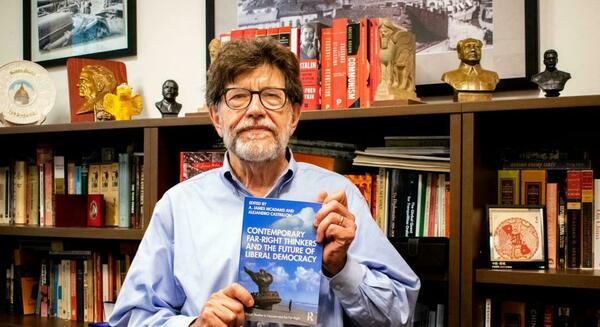
They don’t hold office, don’t make laws, and don’t have any formal claim to power.
But Faculty Fellow A. James McAdams, who directed the Nanovic Institute for European Studies from 2002 to 2018, wants the world to recognize what he describes as “the new threat to liberal democracy”: the often behind-the-scenes thought leaders who inspire far-right movements worldwide.
Those individuals are the subject of a new Kellogg Institute-supported book, “Contemporary Far-Right Thinkers and the Future of Liberal Democracy” (Routledge, 2021), that examines their outsized – and growing – influence on democracy.
“All of them portray themselves as defenders of democracy, but they’re attacking liberal democracy from the inside and using its concepts against it,” said McAdams, a political scientist who co-edited the book with former Kellogg Dissertation Year Fellow Alejandro Castrillón. “That makes these people both new and potentially dangerous.”
“This isn’t a book about the institutions behind liberal democracy. This is a book about the ideas and values that undergird liberal democracy and the figures that spread those ideas.”
The volume is the product of two conferences in 2019 and 2020 funded by the Kellogg Institute for International Studies and the William M. Scholl Chair of International Affairs, an endowed professorship held by McAdams. A panel at the 2019 American Political Studies Association conference also contributed to the project.
“Far-Right Thinkers” is the first book of its kind, addressing the individuals behind right-wing populist movements instead of the movements themselves. It’s also contemporary, with essays on nearly a dozen far-right leaders from around the world, all but one of whom are alive and active (the subject of one essay, French political theorist Guillaume Faye, died during the production of the book).
“This isn’t a book about the institutions behind liberal democracy. This is a book about the ideas and values that undergird liberal democracy and the people who seek to undermine those ideas,” McAdams said. “I wanted to show how people working within the realm of ideas can be politically significant.”
The book explores the differences and similarities of far-right intellectuals in western and eastern Europe, Russia, the United States, Canada, and Australia, including former US presidential candidate Pat Buchanan.
McAdams described them as “vanguardists” who see themselves as movement leaders, not politicians, and operate by delegitimizing democratic norms and institutions. They play a key role in normalizing conspiracy theories like replacement theory, the idea that left-wing political elites are helping nonwhites “replace” the majority-white population in the US.
He cautioned that today’s far-right thinkers aren’t the fascists of the 1920s or ’30s, who attacked democracy “from the outside” in an era when most democracies were weak and struggling to survive. Instead, current far-right leaders operate at a time when liberal democracy is well-established and they can easily spread their ideas online.
“There is a crisis in liberal democracy in the world today, particularly in the West,” said McAdams, who is also the author of a book on communist thinkers, “Vanguard of the Revolution: The Global Idea of the Communist Party” (Princeton, 2019). “But it also has international dimensions because these people are all over the blogosphere and Twitter. I can’t imagine anything more dangerous (to democracy) right now.”
The 15 contributors to the book are the top scholars in their areas of study and come from the United States, Canada, Europe, and Australia. Among them is Faculty Fellow Emma Planinc, a historian of political thought who said that while there is plenty of scholarship on far-right movements, “there is a tendency to study particular movements in isolation: of event, geographical location, or intellectual heritage.
“This book is an attempt – through collaboration and wide areas of expertise – to give readers a picture of the whole, accounting for the nuances of movements across the globe while also facilitating the emergence of a pretty shocking convalescence around a commitment to the destruction of individual rights, and of the liberal, multicultural society,” added Planinc, an assistant professor of political science in the Program of Liberal Studies.
Castrillón, a political theorist who wrote the book’s conclusion, said there has been a troubling global rise in populism and illiberalism in recent years that questions the very foundations of liberal democracy. He noted that some of the thinkers analyzed in the book express sophisticated arguments critiquing the status quo that need to be addressed.
In particular, he said, a number of them center their political theories on racial, ethnic, national, and religious identity – ideas that are seeping into the mainstream and mark the growing importance of identity politics, particularly for the right.
“We sometimes forget the power of ideas and the impact they have on political life,” said Castrillón, an adjunct professor of writing and rhetoric at Holy Cross College. “Some ideas can be quite dangerous. Without a serious reflection on these ideas, we stand the risk of being blindsided by them.”